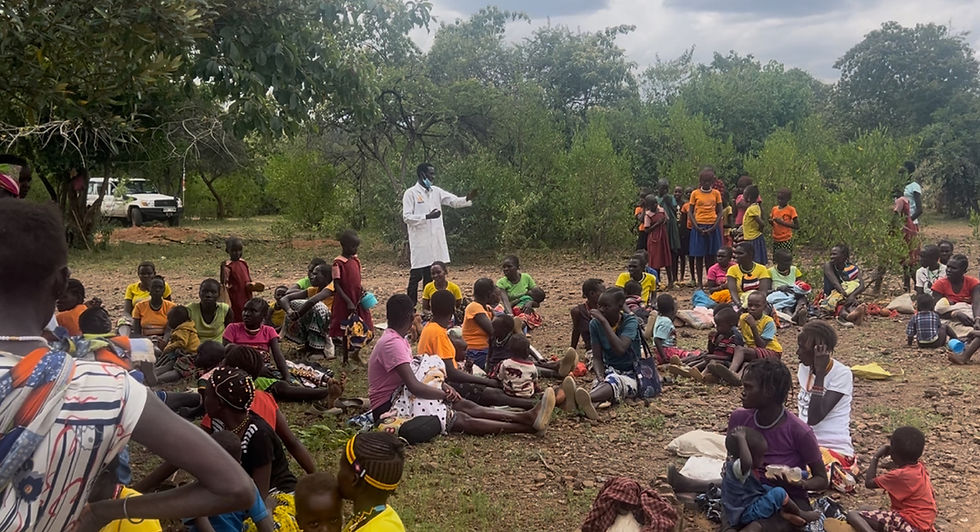Turning Dates into Deadlines: The Road Map to End Obstetric Fistula From Tiaty to Kilifi
- Abigail Williams
- Sep 29, 2024
- 4 min read
For those invested in the fight against Neglected Tropical Diseases (NTDs), 2030 is a year with great expectations. The World Health Organizations (WHO) road map for 2030 includes disease specific and cross cutting targets such as the eradication of yaws and dracunculiasis, and a 90% decrease in people requiring intervention for NTDs.
Located in Tiaty West, Baringo County, The Research on Multi-disease and Educational Services (TERMES) Center focuses on the elimination of disease and poverty in a neglected community. Its traditional emphasis is on NTDs such as visceral leishmaniasis (Kala-azar), trachoma, and snakebites. More recently, a new gap of knowledge came to the attention of our team on maternal health injuries falling under the umbrella of neglected healthcare. An even lesser known aspiration for 2030 adopted by the United Nations General Assembly is to end obstetric fistula in developing countries. This particular goal is deeply reliant on the cooperation between governments, healthcare organizations, and communities. The existence of fistula stems from the combination of traditional cultural practices (e.g. early marriage and pregnancy, female genital cutting) with delayed healthcare access (e.g. financial instability, under-resourced and underfunded healthcare facilities, physical barriers to care). Implementing systems that target prevention of new cases, appropriate treatment of active cases, and expansion of healthcare worker capacity are the most surefire ways to meet this 2030 deadline.
Obstetric fistula, a neglected surgical disease caused by prolonged and obstructed labor, has been found permeating the community in Tiaty, Baringo County due to a multitude of socio-cultural traditions. To combat the burden this preventable disease has on the women of East and West Tiaty, the Baringo team partnered with Probitas Foundation from Spain. In April of 2024 Probitas sent a team of trained fistula surgeons to the Chemolingot sub-county hospital. Their work abroad included free surgical repairs for the women living with complex gynecological injuries, coupled with training for the three local surgeons. While intention was to focus their attention strictly on women with fistula, over half of the 15 women who underwent surgery were found to have conditions with similar presentations of symptoms such as urinary incontinence. Upon reflection after her successful surgery for rectal-vaginal fistula, one woman’s gratitude to those who have supported her in the process of treatment is immense. Her takeaway from receiving support of her own was as follows:
“When you see other people with the same signs, you refer them. Make sure you help women experiencing the symptoms, so they are not alone.”
The support of Kaperur Community Based Organization and community health promoters (CHPs) has encouraged her to advocate on behalf of other women in the village who have not been able to seek treatment due to severe social stigma and feelings of isolation. While community acceptance for these women still has a long way to go, the women who have gone through the treatment and now are better informed are the new instruments of social change, health and autonomy in these communities.
In accordance with these measures being implemented for care and treatment, prevention and early intervention are crucial for the reduction/elimination of fistula. Interventions for proper screening and community awareness of the disease have been designed by Hellen Nyakundi and Dr. Elizabeth Chebet to maximize the success of outreach programs in neighboring communities like Tangulbei Sub-County Hospital. On July 18th, 2024, we traveled to Tangulbei in Tiaty East where upon presentation of a white coat and certificate, eleven nurses and CHPs completed a sensitization training for fistula, so they could identify and refer potential fistula cases to hospitals better suited for treatment.

Meanwhile, seasoned fistula programs in East Africa, such as the Fistula Foundation - Kenya are spearheading efforts to end preventable obstetric diseases by the next generation of mothers. Since 2014 they have debuted a collaborative network of outreach programs, surgical centers, healthcare worker training, and support groups to combat the fight against fistula. At the heart of this organization sits Habiba Mohammed. Her journey in psycho-social support for women in vulnerable positions influenced her passion for neglected maternal conditions. She centered her mission for the foundation around 4 distinct goals: increase access to care, establish treatment networks, strengthen community outreach, and maximize capacity building. So far, the foundation has demonstrated its commitment for these goals by partnering with six organizations and setting up ten treatment centers/ hospitals in Kenya. This foundation's priority revolves around treatment, but Habiba emphasizes that to meet the target of ending fistula by 2030, there is an even greater need for prevention and education. Her mantra:
“You don’t need to treat what you don’t have”.
Partnering with Women and Development Against Distress in Africa (WADADIA) the Fistula Foundation - Kenya celebrated the launch of a new gynecological hospital on August 23rd, 2024 which I attended with my colleague Abigail Binkley. As a part of this four-floor hospital grand opening, free surgeries for women suffering from various post-partum injuries including fistula, incontinence, fibroids, prolapse, and cystocele were provided during the week-long medical camp. By the fourth day of the camp, over 450 women were awaiting treatment, with over 60 admitted and 20 surgeries completed. Of these women, a small portion were from Kilifi County themselves, with patients journeying all the way from Somalia and Masai Mara to Malindi. The launch itself included testimonies from fistula survivors, surgeons, Habiba Mohammed, and the deputy governor of Kilifi County Flora Mbetsa. An overwhelming sense of joy and community flowed through the events of the day as women coming out of isolating and dehumanizing situations hugged, danced, and sang, hand-in-hand. The WADADIA hospital is an invaluable milestone for women on the coast of Kenya, and a pillar of hope for those fighting for the 2030 elimination of fistula in low-middle income economies around the globe.





Comments